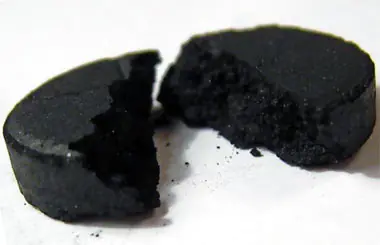The activated carbon diet (charcoal diet) is one of the most popular diets recently. Many famous actresses and models use activated charcoal for weight loss. But how does this diet work and is it really effective?
Basic properties of coal
Activated carbon is a product obtained from ordinary carbon by treating it with high temperatures and steam. This makes the coal more porous and capable of absorbing various substances. Coal has the ability to remove toxins, decay products, gases and excess water from the human body. Coal began to be used in medicine back in the 19th century. Nowadays, activated carbon is the most popular remedy for poisoning, flatulence, diarrhea and allergies. Therefore, for many it was a discovery that charcoal can promote weight loss. Nutritionists debate the effect of charcoal on weight loss, but recommend it for detoxifying the body.
Methods of using activated carbon for weight loss
There are several ways to take activated charcoal to lose weight.
The first method is the most gentle. On an empty stomach you need to take 2 tablets of activated charcoal with one glass of water. In this case, there is no need to radically change your diet, but you must definitely eat at least 300 grams of vegetables and 150 grams of low-fat cottage cheese. This diet plan allows you to lose about 1 kilogram per week.
There is another way to use activated carbon for weight loss. This method involves taking large doses of coal at the rate of 1 tablet per 10 kilograms of weight. This dose can be taken in the morning on an empty stomach or divided into equal portions and taken throughout the day an hour before meals with plenty of water.
You can also start the weight loss process with the first method and end with the second. It is recommended to use charcoal for 60 days, alternating 10 days on and 10 days off.
Contraindications to the use of activated carbon
Taking activated carbon has a number of contraindications. Their presence is explained by the fact that initially coal was used to remove toxic substances from the body, and not for weight loss. Thus, excessive consumption of coal can lead to the leaching of useful substances such as vitamins, microelements, proteins and fats. Long-term use of coal leads to digestive disorders: constipation, diarrhea, vomiting. Allergic reactions may also occur.
People with ulcerative lesions of the stomach and duodenum, or gastric bleeding, should not take charcoal. Caution is advised when combining the use of activated carbon with other medications.
Official medicine opposes the use of coal for the purpose of losing excess weight. You should consult your doctor before taking large doses of activated charcoal for weight loss.
In conclusion, it must be emphasized that the activated carbon diet (charcoal diet) can be effective for weight loss, but it has its own contraindications and risks. Before you start using charcoal for weight loss, you should consult your doctor and follow the recommendations for use. It is also important to remember that the activated carbon diet is not a panacea and cannot replace a healthy lifestyle, proper nutrition and physical activity.



